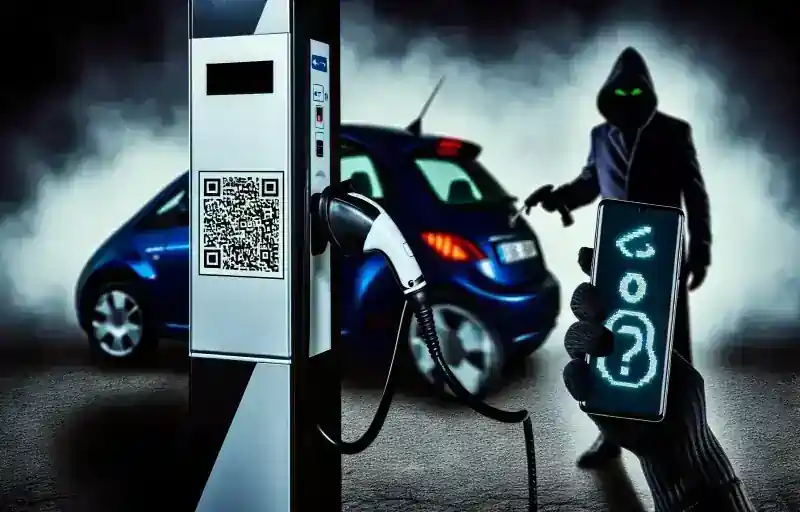
“Charge Smart, Stay Alert: Protect Your EV from Quishing Scams at Charging Stations”
Rising Cyber Threats at EV Charging Stations: How to Protect Yourself from Quishing Attacks
Electric vehicle (EV) owners, beware: a new type of cyber threat known as a quishing attack is increasingly targeting charging stations. This malicious tactic combines QR codes with phishing strategies to deceive unsuspecting EV drivers, potentially leading to financial theft or malware installation on their devices. The method of quishing exploits the widespread use and growing prevalence of QR codes, which are often perceived as harmless and are commonly used by businesses to share information, process payments, or direct users to websites.
The FBI has noted an uptick in scammers directing victims to use physical crypto ATMs and QR codes for payment transactions. As electric vehicles gain popularity, the number of public charging stations has surged, many of which now employ QR codes for easy payment and activation. However, this convenience has also attracted cybercriminals who see an opportunity to exploit EV owners.
The scam operates by placing fraudulent QR code stickers over the legitimate ones at charging stations. When drivers scan these counterfeit codes with their smartphones, they are redirected to malicious websites that mimic authentic payment portals. Unwittingly, victims may input their credit card information or other sensitive data, which scammers then capture.
“This is a particularly insidious form of fraud because it preys on people’s trust in familiar technology,” explains cybersecurity expert Dr. Emma Thompson. “QR codes have become so ubiquitous that we often scan them without a second thought.” The consequences of falling victim to a quishing attack can be severe, ranging from financial losses to unknowingly downloading malware that compromises personal data and potentially grants hackers access to other accounts.
While current quishing attacks primarily target mobile devices, experts warn that future iterations could potentially affect the vehicles themselves. “As cars become more connected, the risk of cyber attacks extends beyond our phones,” cautions automotive security specialist Mark Rodriguez. “It’s crucial that both charging station operators and EV manufacturers stay ahead of these threats.”
To protect yourself from quishing scams, experts recommend taking several precautions. Before scanning any QR codes, inspect charging stations for signs of tampering. Whenever possible, use official charging apps from reputable providers and avoid entering payment information on unfamiliar websites. Keeping your mobile device’s operating system and security software up to date is also crucial. Additionally, report any suspicious activity to the charging station operator and local authorities.
Charging station companies are responding by implementing enhanced security measures such as tamper-evident QR code stickers and regular station inspections. As the EV market continues to expand, it’s likely that cybercriminals will develop new methods to target drivers. Staying informed and vigilant is key to protecting yourself and your vehicle from these evolving threats.
“The transition to electric vehicles brings many benefits, but it also introduces new security challenges,” says Thompson. “By raising awareness and implementing robust security measures, we can ensure that the EV revolution doesn’t come at the cost of our cybersecurity.”
As with any new technology, the key to safe adoption lies in education and caution. EV owners should remain alert and skeptical when using public charging stations, treating QR codes with the same caution they would apply to suspicious emails or text messages. By staying informed and following best practices, EV drivers can continue to enjoy the benefits of electric mobility while minimizing their risk of falling victim to quishing and other cyber scams.














